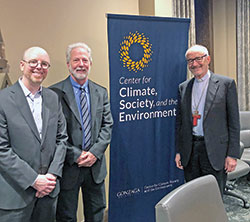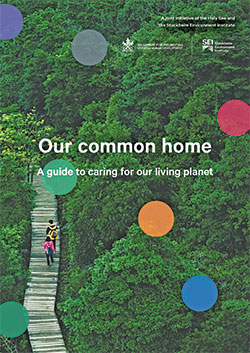Archdiocesan Catholic helps launch worldwide Laudato Si’ implementation guide

John Mundell, center, a member of Our Lady of Lourdes Parish in Indianapolis, poses with Brian Henning, left, and Cardinal Michael F. Czerny in a recent event at Gonzaga University in Spokane, Wash., to help launch “Our Common Home: A Guide to Caring for Our Living Planet.” Mundell is the director of the Laudato Si’ Action Platform, a part of the Vatican’s Dicastery for Integral Human Development, which is led by Cardinal Czerny. Henning is a professor of philosophy and environmental studies at Gonzaga. (Submitted photo)
By Sean Gallagher
John Mundell walked with his two grandsons along the banks of the White River in Indianapolis picking up trash earlier this year.
He reveled in seeing the young boys making a game of it, calling the trash “treasure” and taking it to the “treasure store”—a nearby trash can.
It’s little stories of hope for the care of creation like this that motivate Mundell, in his work as the director of the Vatican’s Laudato Si’ Action Platform to encourage leaders in the Church, education, health care and business around the world to do the same.
Founded a little more than a year ago, the platform is the Vatican’s initiative to encourage the implementation of the principles of Pope Francis’ 2015 encyclical letter on the environment, “Laudato Si’: On Care for Our Common Home.”
The platform is part of the Vatican’s Dicastery for Integral Human Development, led by Canadian Cardinal Michael F. Czerny.
On Feb. 14, Mundell took part in an online press conference to launch the platform’s “Our Common Home: A Guide to Caring for Our Living Planet,” which offers practical suggestions for protecting the environment and ways to reflect on the spiritual nature of this work.
During the press conference, he reflected on the time he spent along the White River with his grandsons.
“I was overwhelmed by their enthusiasm and recognized in these simple actions the root of the ecological conversion we all need to undergo to make a difference,” Mundell said, “a difference that responds not only to the cry of the Earth and the cry of the poor as ‘Laudato Si’ ’ reminds us, but also to the cry of our children, our grandchildren and all future generations that follow.”
The future of his grandchildren, their generation and those that follow led Mundell to call for action now in caring for creation.
“The time for polite conversations and speeches is past,” said Mundell in the press conference. “Only dramatic changes beginning today, right now, in both our personal lifestyles and choices as well as our communal policies and governance will head off the rising temperatures and their devastating consequences.”
Although only about a year old, the platform already has thousands of members, from individuals and families to parishes, dioceses, schools, hospitals and businesses that have millions of people connected to them.
 The platform’s newly launched guide will help its members and all who read it to formulate achievable plans to care for the environment in their own particular corner of creation.
The platform’s newly launched guide will help its members and all who read it to formulate achievable plans to care for the environment in their own particular corner of creation.
“We’re trying to encourage people to take those steps and be more concrete,” said Mundell, a member of Our Lady of Lourdes Parish in Indianapolis in a recent interview with
The Criterion. “We’ve done a good job as a Church of talking about what we think is important. But we haven’t been as good at making the commitment to do the [work to achieve them].”
Mundell has worked in environmental matters for decades, first helping large corporations clean up pollution, then, for the last 28 years, operating his own environmental consulting firm based on Indianapolis’ east side.
He’s also had decades of experience collaborating with Catholics and Church leaders around the world through his involvement in Focolare, a lay movement in the Church founded in 1943 in Italy.
Mundell describes all this background as the “golden thread” that he sees as God’s providential way of preparing him for his current worldwide ministry in leading the platform.
“Over time, I’ve seen that my business experiences have been very valuable—project managing, budgeting, lots of practical things and the environment part, cleaning up pollution and working with agencies,” he said. “And that whole openness toward other cultures in work in Focolare globally has been brought in, too.”
Seeing all these providential connections is helpful for Mundell as he meets—online and in person—with people around the world in promoting the work of the platform.
“It’s incredibly challenging, but also totally fulfilling. It’s something I feel called to do, like a vocation,” he said. “I think we’re living in one of the most exciting times in the Church’s history.”
During the next year, Mundell hopes to see more individuals and organizations joining the platform and submitting plans that the guide and other online resources can help them formulate.
“A year from now, I hope that this will be in the hands of most of the bishops,” he said. “The environment is a moral issue, not just a political issue. Hopefully, in the United States especially, we can make some headway in communicating with parishes, schools and the hierarchy about why they should have this as part of their program.”
Through it all, Mundell will keep in mind the image of his two young grandsons picking up trash along the White River.
“I’m going to work my tail off because I’m doing this for them.”
(To learn more about the Laudato Si’ Action Platform and view its guide, visit laudatosiactionplatform.org. Links to the guide in various languages can be found at bit.ly/LaudatoSiGuide.) †

